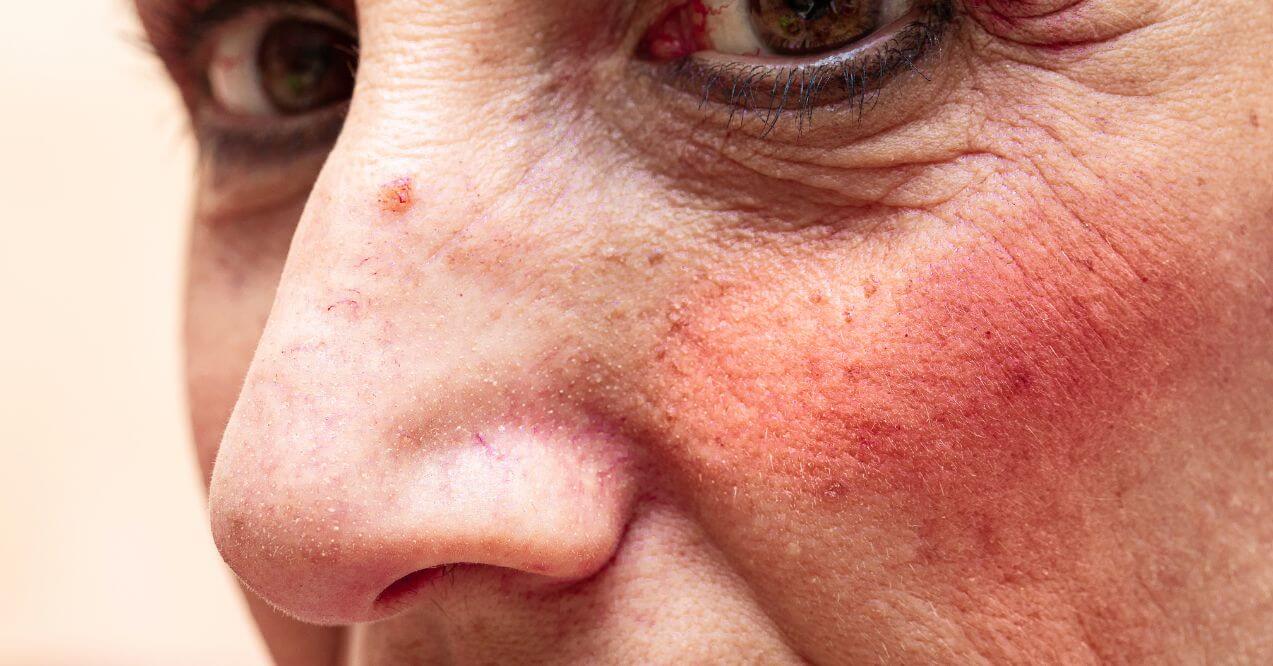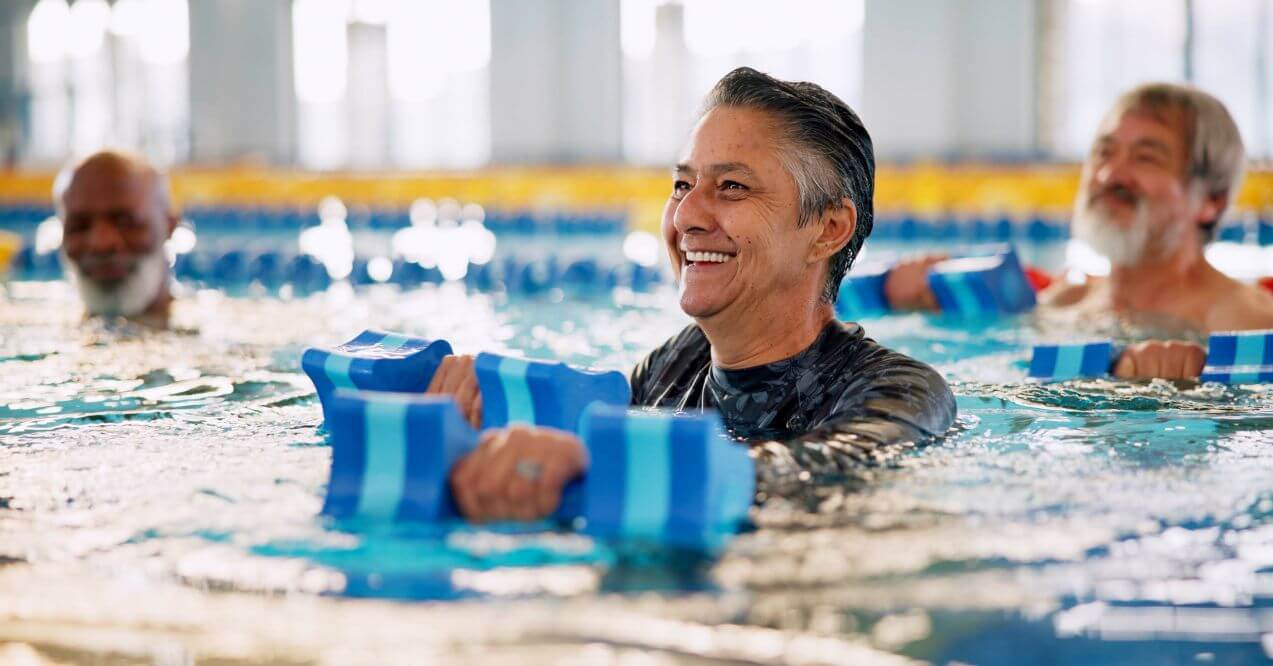What is My Biological Age? Use Our Free Biological Age Calculator!
Find out your biological age with our free calculator. This guide explains how to calculate it, what factors influence it most, and simple, science-backed ways to lower your age through lifestyle changes.
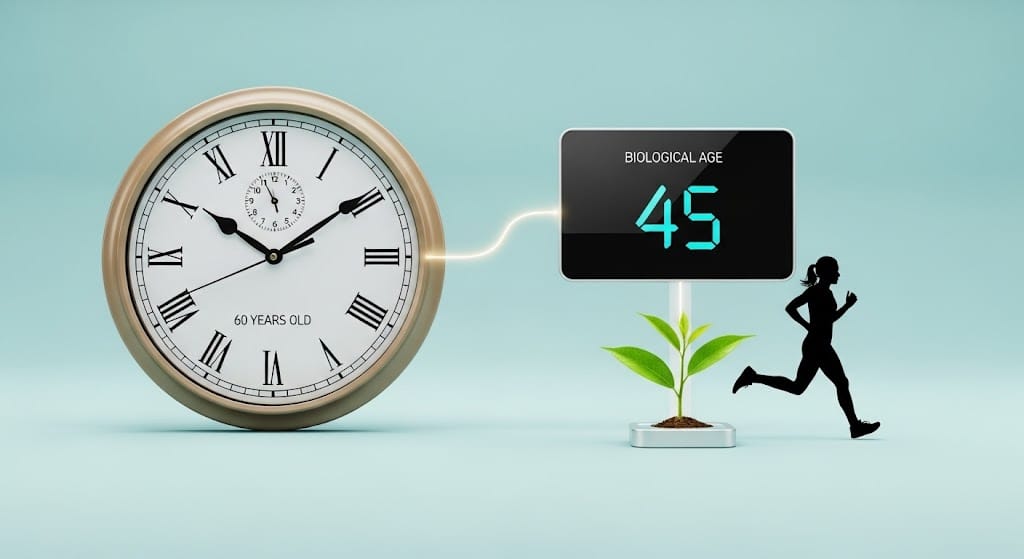

Your biological age measures how fast your body is truly aging. Unlike the number on your birth certificate, you can change it. And knowing it can change your future.
Think of biological age as your body’s internal clock. Some people’s bodies function like they’re years younger. Others show signs of faster aging. Understanding your age helps you make smarter health choices.
In this article, you’ll find our free biological age calculator. You’ll also learn what factors influence your age and how to slow down aging. Ready to see where you stand?
What Is Biological Age and Why It Matters
Your biological age reflects how well your body functions. It doesn’t matter how many birthdays you’ve had.
Think of two cars from the same year. One runs perfectly. The other is falling apart. Your body is similar. A 50-year-old could have the body of a 30-year-old.
Key factors that determine your biological age include:
- Cell repair
- Heart health
- Memory
- Inflammation
- Muscle and bone strength
Why does this matter? Your biological age is a powerful predictor of your health. It can show your risk for chronic disease. The best part? You can actively work to improve it.
How to Calculate Your Biological Age
You have a few options to find your biological age. Each offers a different level of accuracy.
1. Free Self-Assessment Quizzes – These are quick and easy. They use questions about your habits to give you a general idea. Best for: Getting started and tracking lifestyle changes.
2. Blood Tests – These are more accurate. They look at things like inflammation and blood sugar. Best for: Science-based results with moderate cost.
3. DNA Tests – This is the most accurate method. It analyzes how your genes are working. Best for: Those who want the most precise, detailed results.
Use Our Free Biological Age Calculator
Ready to find your number? Our free calculator is a simple, science-based quiz. It uses your lifestyle habits to estimate your body’s age. It takes minutes and gives you instant results.
The calculator looks at key areas, including:
- Sleep
- Exercise
- Stress
- Nutrition
- Social habits
Ready to discover your biological age? Take our free biological age calculator now and see where you stand. We recommend retaking the assessment every few months as you implement healthy changes to track your progress and see how your biological age responds to lifestyle improvements.
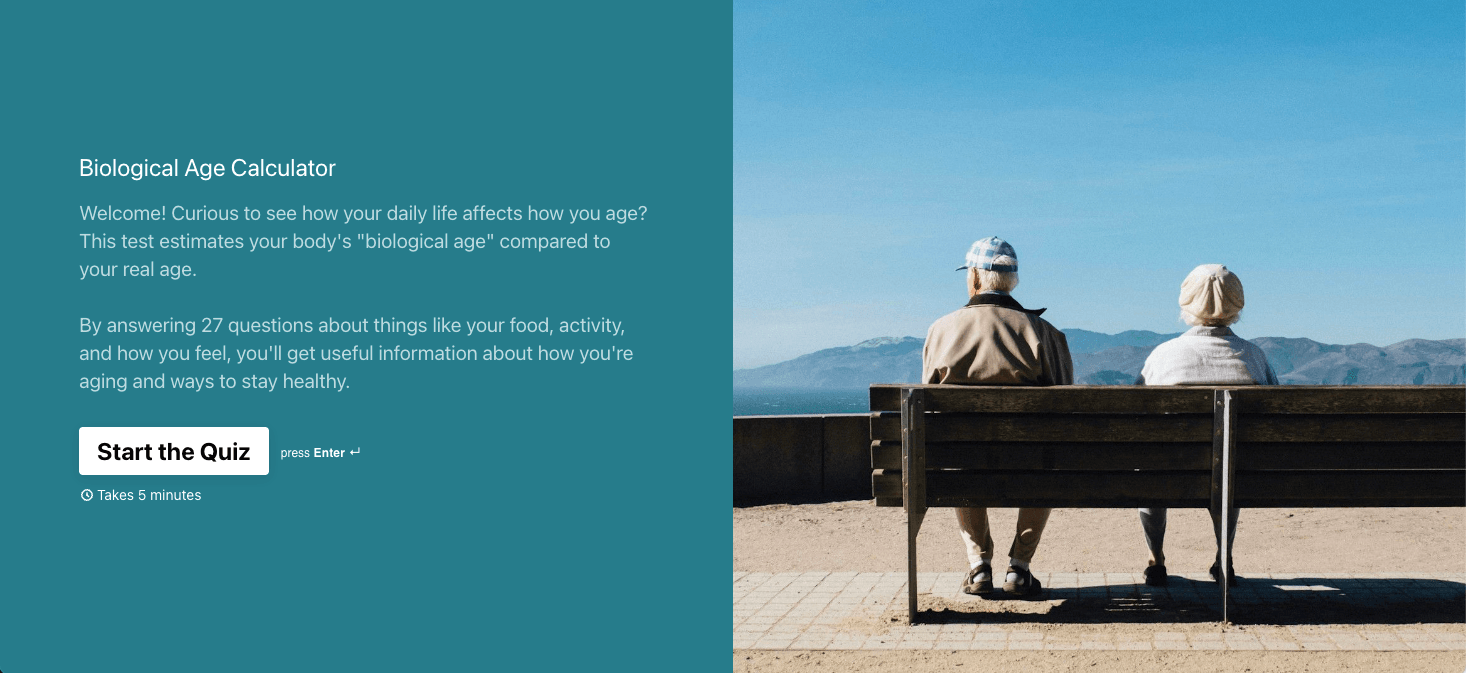
What Affects Your Biological Age the Most
Your lifestyle choices have the biggest impact on how fast you age. Small changes can make a big difference.
1. Nutrition
Diets rich in whole, plant-based foods provide nutrients that support cellular repair and reduce inflammation throughout the body. Processed foods and excessive sugar intake can accelerate aging markers, while colorful vegetables, fruits, and healthy fats promote longevity.
- Focus on eating a rainbow of vegetables and fruits daily
- Choose whole grains over refined options to support sustained energy
2. Exercise
Regular physical activity stimulates cellular regeneration, strengthens muscle tissue, and improves cardiovascular function. Even moderate movement like walking can significantly impact your biological age by maintaining muscle mass and bone density as you age.
- Aim for 150 minutes of moderate activity weekly
- Include both cardio and strength training for comprehensive benefits
3. Sleep
Quality rest allows your body to repair damaged cells, regulate hormones, and clear metabolic waste from the brain. Poor sleep patterns accelerate aging by disrupting these essential recovery processes.
- Maintain consistent sleep and wake times, even on weekends
- Create a cool, dark environment to support deeper rest
4. Stress Management
Chronic stress elevates inflammation markers and accelerates cellular aging through increased cortisol production. Learning to manage daily stressors can significantly slow biological aging processes.
- Practice daily relaxation techniques like deep breathing or meditation
- Build strong social connections to support emotional resilience
5. Environmental Toxins
Exposure to smoking, excessive alcohol, and environmental pollutants creates oxidative stress that damages cells and accelerates aging. Reducing these exposures supports your body’s natural repair mechanisms.
- Limit alcohol consumption to moderate levels
- Choose organic produce when possible to reduce pesticide exposure
Can You Lower or Reverse Your Biological Age?
Yes! It’s possible to reverse it.
Researchers call this “epigenetic flexibility.” It means your genes respond to healthy habits. In 2023 study, people in an eight-week program saw their biological age drop by over three years.
Every small upgrade matters. These habits support cell repair and gradually nudge your biological age in a younger direction.
Products That Support Healthy Aging from the Inside Out
Support your healthy aging goals with targeted supplements designed to work from the inside out:
Youth Switch – Formulated with Ashwagandha and Cat’s Claw Bark Extract, this advanced blend supports cellular function, stress adaptation, and overall vitality – helping you feel younger and more energized as you age. Ideal for promoting long-term healthy aging from the inside out.
Metabolic Reds+ – This low-glycemic drink delivers probiotics, digestive enzymes, and antioxidants to revitalize your metabolism and promote daily vitality. As nutrient absorption becomes more difficult with age, Metabolic Reds+ helps fill in the gaps with easy-to-absorb compounds in a delicious, low-glycemic drink.
Liver Health Formula – Packed with Milk Thistle, Turmeric Root, and L-Cysteine, this blend supports liver detoxification and helps reduce internal stressors. It promotes optimal liver function, aids digestion, and supports cellular repair – key factors for maintaining a healthy biological age.
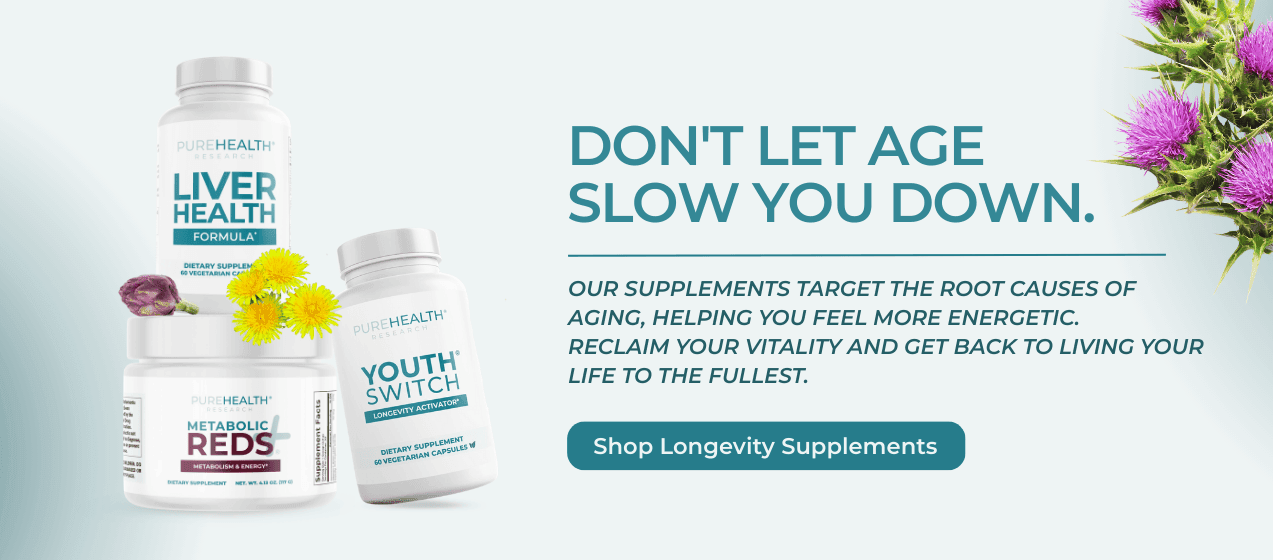
Final Thoughts About Your Age
Biological age is a tool for self-awareness. It shows how your lifestyle affects your health. Use our free calculator to get started, then pick one or two habits to improve. You can always re-test and track your progress. Your future is in your hands.
A biological age calculator is a free online tool that estimates how fast your body is aging based on lifestyle factors like sleep, diet, activity, and stress – helping you understand your health beyond your actual age.
You can check your biological age at home using a free calculator or with more advanced options like blood biomarker tests or DNA methylation kits. These range from simple self-assessments to detailed lab-based insights delivered to your door.
Basic tools offer general guidance, while clinical tests like DNA methylation analysis provide greater accuracy. If you’re interested in tracking lifestyle impact or optimizing long-term health, biological age testing can be a helpful, motivating tool.
Sign up for our Healthy Living newsletter!
Advertisement. This site offers health, wellness, fitness and nutritional information and is designed for educational purposes only. You should not rely on this information as a substitute for, nor does it replace, professional medical advice, diagnosis, or treatment. If you have any concerns or questions about your health, you should always consult with a physician or other health-care professional. Do not disregard, avoid or delay obtaining medical or health related advice from your health-care professional because of something you may have read on this site. The use of any information provided on this site is solely at your own risk.



